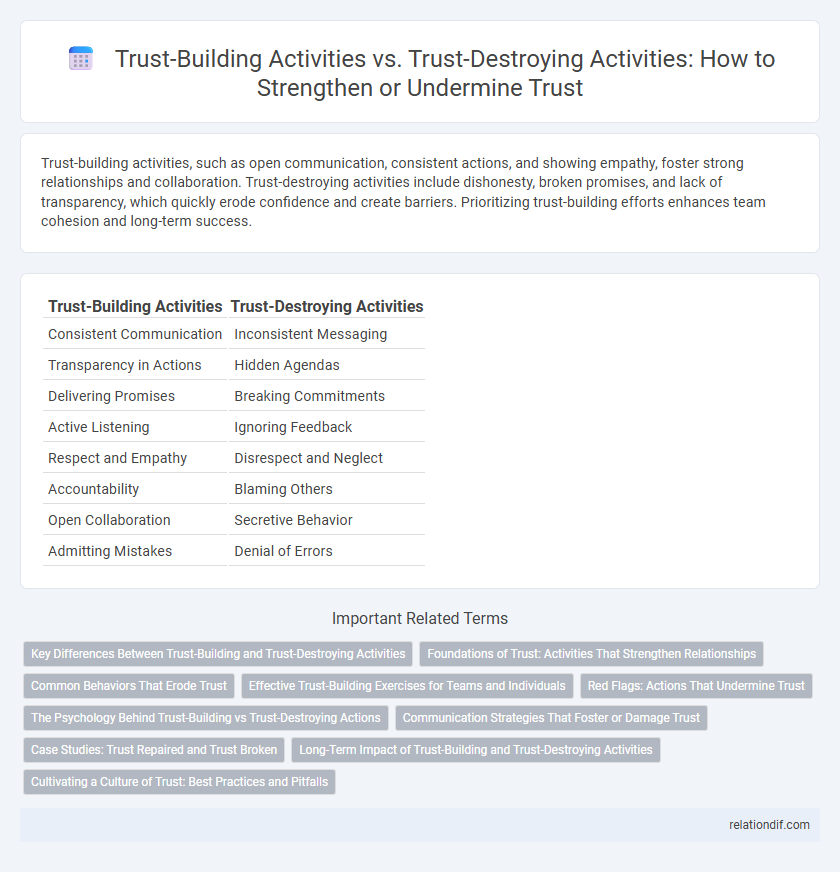Trust-building activities, such as open communication, consistent actions, and showing empathy, foster strong relationships and collaboration. Trust-destroying activities include dishonesty, broken promises, and lack of transparency, which quickly erode confidence and create barriers. Prioritizing trust-building efforts enhances team cohesion and long-term success.
Table of Comparison
| Trust-Building Activities | Trust-Destroying Activities |
|---|---|
| Consistent Communication | Inconsistent Messaging |
| Transparency in Actions | Hidden Agendas |
| Delivering Promises | Breaking Commitments |
| Active Listening | Ignoring Feedback |
| Respect and Empathy | Disrespect and Neglect |
| Accountability | Blaming Others |
| Open Collaboration | Secretive Behavior |
| Admitting Mistakes | Denial of Errors |
Key Differences Between Trust-Building and Trust-Destroying Activities
Trust-building activities foster open communication, consistency, and transparency, leading to stronger relationships and increased collaboration. Trust-destroying activities involve deceit, broken promises, and lack of accountability, which erode confidence and create conflict. The key differences lie in the intention and impact of actions, where trust-building promotes reliability and trust-destroying results in suspicion and disengagement.
Foundations of Trust: Activities That Strengthen Relationships
Trust-building activities such as transparent communication, consistent reliability, and active listening create a solid foundation for strong relationships by fostering honesty and mutual respect. Engaging in collaborative problem-solving and demonstrating empathy enhances emotional connections, reinforcing trust over time. These foundational practices differentiate trust-building from behaviors that undermine confidence, ensuring relationships remain resilient and constructive.
Common Behaviors That Erode Trust
Common behaviors that erode trust include dishonesty, lack of transparency, and inconsistency in actions and communication, which create uncertainty and doubt. Ignoring commitments, failing to listen, and showing disrespect undermine relationships and damage credibility. Persistent secrecy and withholding information foster suspicion and break down collaborative efforts.
Effective Trust-Building Exercises for Teams and Individuals
Effective trust-building exercises for teams and individuals include transparent communication practices, collaborative problem-solving activities, and consistent demonstration of reliability and accountability. Activities such as trust falls, open feedback sessions, and joint goal setting foster psychological safety and mutual respect, strengthening interpersonal bonds. Avoiding behaviors like secrecy, blame-shifting, and inconsistent follow-through prevents erosion of trust and enhances long-term cooperation.
Red Flags: Actions That Undermine Trust
Red flags that undermine trust include consistently breaking promises, withholding critical information, and displaying dishonest behavior. Trust-building activities prioritize transparency, active listening, and following through on commitments to foster strong relationships. Recognizing and addressing these destructive actions early prevents long-term damage and promotes a culture of reliability and accountability.
The Psychology Behind Trust-Building vs Trust-Destroying Actions
Trust-building activities activate the brain's reward system by releasing oxytocin, promoting feelings of safety and cooperation, while trust-destroying actions trigger stress responses that increase cortisol levels, leading to fear and withdrawal. Consistent positive interactions reinforce neural pathways associated with trust, enhancing relationship resilience. Conversely, breaches of trust disrupt these pathways, causing cognitive dissonance and emotional distancing that undermine future trust development.
Communication Strategies That Foster or Damage Trust
Transparent communication, active listening, and consistent messaging serve as trust-building activities by promoting openness and reliability. Conversely, withholding information, sending mixed signals, and using manipulative language damage trust by creating confusion and skepticism. Implementing honest dialogue and empathetic responses strengthens relationships, while ambiguous or deceptive communication undermines confidence and cooperation.
Case Studies: Trust Repaired and Trust Broken
Case studies reveal that trust-building activities such as transparent communication, consistent follow-through, and active listening effectively repair fractured relationships by fostering reliability and emotional safety. Conversely, trust-destroying activities including deception, broken promises, and a lack of accountability lead to significant relational damage and loss of credibility. Analysis of real-world examples in organizational and interpersonal contexts underscores how repaired trust enhances collaboration, while broken trust results in conflict and disengagement.
Long-Term Impact of Trust-Building and Trust-Destroying Activities
Trust-building activities, such as consistent communication, transparent decision-making, and reliable follow-through, foster long-term relationships by creating a foundation of credibility and emotional safety. In contrast, trust-destroying activities like broken promises, lack of accountability, and dishonest behavior have a magnified negative impact over time, often leading to irreparable damage and erosion of collaborative potential. The cumulative effects of these activities determine the sustainability of trust, with positive actions reinforcing loyalty and negative actions amplifying distrust exponentially.
Cultivating a Culture of Trust: Best Practices and Pitfalls
Cultivating a culture of trust requires consistent trust-building activities such as transparent communication, accountability, and active listening, which foster psychological safety and collaboration. Trust-destroying activities like withholding information, broken promises, and blame culture erode morale and hinder team performance. Best practices emphasize empathy and recognition, while pitfalls include favoritism and inconsistent behaviors that quickly undermine trust.
Trust-building Activities vs Trust-destroying Activities Infographic

 relationdif.com
relationdif.com